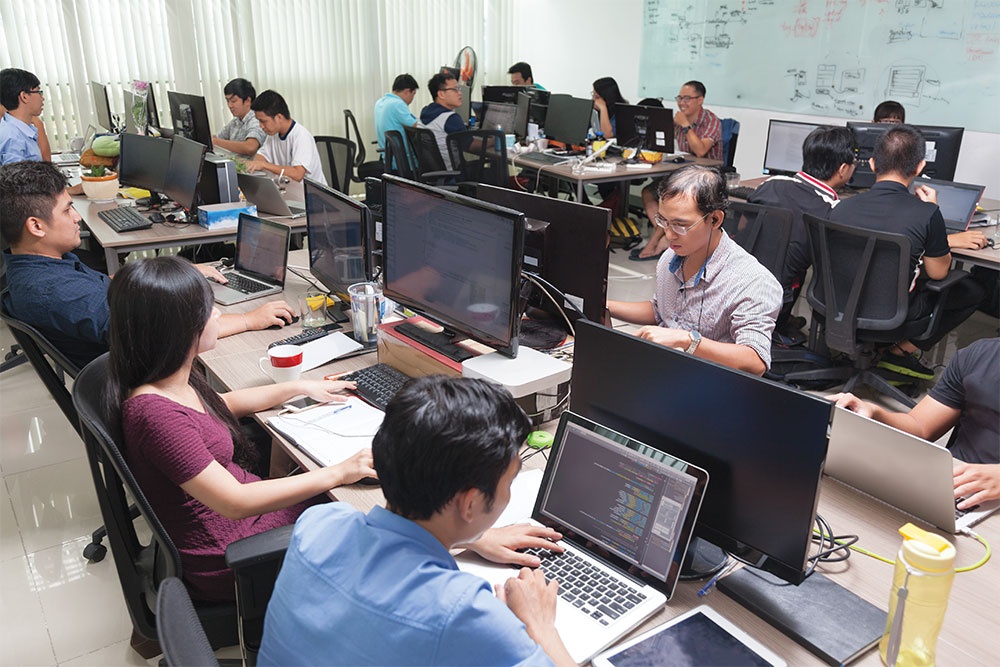Funding freeze thaws tech startup ambitions
 |
| Funding freeze thaws tech startup ambitions, Photo: Shutterstock |
Vietnam’s technology startups are cutting operating costs and reducing staff. Do Huy Dung, CEO of Vietnam Investment Group (VIG), said, “Most startups in Vietnam are not profitable yet. Many companies are starting to cut 15-20 per cent of their staff, and the rate could increase to 50 per cent if investors no longer pour in capital.”
VIG is pouring capital into dozens of startups such as Elsa, Kid Plaza, Juno, Seedcom, Teko and has also divested capital from many other renowned businesses and startups, such as Petrolimex, Tien Phong Plastic, VNDirect, and MoMo.
Dung explained that investors are becoming more cautious with their ventures. Startups with good ideas and quality products can still be rejected if there are problems with personnel, operations, or financial data.
“Vietnam’s technology market does not have many long-term investors, which is why when the global economy worsens, they quickly withdraw,” he said. “The difficulty will last longer and startups must prepare solutions, at least in the next 18 months.”
According to a fintech report for Vietnam covering the first half of this year, published by market analysis platform Tracxn Technologies, the collective funding into Vietnamese tech startups plummeted by 82 per cent to reach $66 million in the first half of 2023, a notable downturn from the $372 million recorded in 2022.
Fintech, one of the most active venture investing segments over the past few years, suffered the steepest decline with 67 per cent, from nearly $18 million to $6.2 million over the same period last year.
Tracx Technologies analysed that early-stage funding in the first half of 2023 was also 32 per cent lower than the $7.5 million in the second half of 2022. Additionally, the fintech sector in Vietnam has not yet created any unicorns, nor witnessed any acquisitions or initial public offerings within the past two years.
In the context of an increasingly difficult and vulnerable market, experts said that investor tastes are also changing, creating a natural screening for startups to find a more sustainable direction.
“Instead of spending on human and financial resources for rapid growth, startups can focus more on products to meet the needs of the market,” said Le Hoang Uyen Vy, co-founder and CEO of Do Ventures Fund.
Vy added that in the past, investors often based their evaluation on the startup’s growth rate and revenue, but now they would ask businesses more about operating costs, the structure between costs and profits in the future. “These questions will help companies operate more systematically and aim for long-term growth and performance,” Vy said.
Although the gloomy situation still covers technology startups, some fields such as edtech, healthtech, or some fintech industry groups were still attracting the attention of investors.
“In Vietnam, the payments and wealthtech industries still saw positive growth. This is also a good opportunity for many startups in Vietnam to take advantage of their resources to bring their products to the international market,” said Tran Dinh, head of the fintech department of the Vietnam Blockchain Association (VBA).
From the experience of working with foreign investment funds, Vietnam is still the preferred destination for fintech investors. To help projects connect with potential investors, the VBA has launched the SwitchUp startup accelerator programme on giving projects the opportunity to consult international experts and pitch capital with more than 50 venture capital funds from many countries.
“We also implemented the ChainTracer anti-fraud project to contribute to information transparency and the purification of fraudulent projects, increasing investor confidence,” said Eric Hung, deputy head of investment promotion at the VBA.
According to the Ministry of Science and Technology, the country currently has over 3,800 startups in the technology sector. Vietnam is also a favourite destination for just over 200 active venture capital funds, including about 40 domestic investment funds.
Despite the decline from the prolonged capital raising market during the funding winter, domestic technology companies with promising digital technology platforms are still a choice for foreign investment funds. According to TechinAsia, Vietnam ranked third in Southeast Asia in terms of total capital in the technology sector in the first half of 2023, behind Singapore and Indonesia.
 | Vietnamese fintech startups secure a mere $6.2 million funding in 1H/2023 Vietnam's records experienced a significant decline in fintech funding, with the total amounting to a lower-than-expected $6.2 million in the first half of 2023. |
 | Vietnam's edtech startups gain attention from purpose-driven investors Vietnam's edtech market is continuing to receive an influx of fresh capital as home-grown edtech startups receive attention from purpose-driven investors. |
 | Edtech arena remaining positive with major moves Venture capital continues to flow into edtech despite a decline in the tech startup market. |
What the stars mean:
★ Poor ★ ★ Promising ★★★ Good ★★★★ Very good ★★★★★ Exceptional
Themes: Digital Transformation
- PM sets five key tasks to accelerate sci-tech development
- Ho Chi Minh City launches plan for innovation and digital transformation
- Dassault Systèmes and Nvidia to build platform powering virtual twins
- Sci-tech sector sees January revenue growth of 23 per cent
- Advanced semiconductor testing and packaging plant to become operational in 2027
Related Contents
Latest News
More News
- Ho Chi Minh City launches plan for innovation and digital transformation (February 25, 2026 | 09:00)
- Myriad risks ahead, but ones Vietnam can confront (February 20, 2026 | 15:02)
- Vietnam making the leap into AI and semiconductors (February 20, 2026 | 09:37)
- Funding must be activated for semiconductor success (February 20, 2026 | 09:20)
- Resilience as new benchmark for smarter infrastructure (February 19, 2026 | 20:35)
- A golden time to shine within ASEAN (February 19, 2026 | 20:22)
- Vietnam’s pivotal year for advancing sustainability (February 19, 2026 | 08:44)
- Strengthening the core role of industry and trade (February 19, 2026 | 08:35)
- Future orientations for healthcare improvements (February 19, 2026 | 08:29)
- Infrastructure orientations suitable for a new chapter (February 19, 2026 | 08:15)

 Tag:
Tag:



















 Mobile Version
Mobile Version